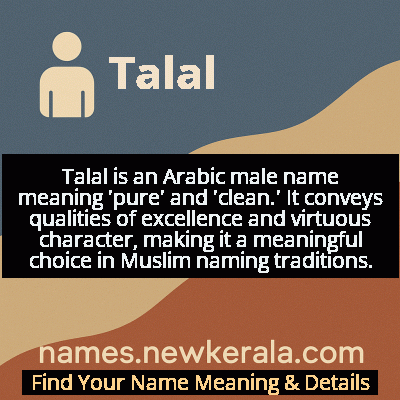Talal Name Meaning & Details
Origin, Popularity, Numerology Analysis & Name Meaning of Talal
Discover the origin, meaning, and cultural significance of the name TALAL. Delve into its historical roots and explore the lasting impact it has had on communities and traditions.
Name
Talal
Gender
Male
Origin
Muslim
Lucky Number
1
Meaning of the Name - Talal
Talal is an Arabic male name meaning 'pure' and 'clean.' It conveys qualities of excellence and virtuous character, making it a meaningful choice in Muslim naming traditions.
Talal - Complete Numerology Analysis
Your Numerology Number
Based on Pythagorean Numerology System
Ruling Planet
Sun
Positive Nature
Leaders, ambitious, highly driven, self-reliant, innovative.
Negative Traits
Overly aggressive, domineering, impatient, selfish.
Lucky Colours
Red, orange, gold.
Lucky Days
Sunday.
Lucky Stones
Ruby, garnet.
Harmony Numbers
2, 3, 9.
Best Suited Professions
Entrepreneurs, managers, engineers.
What People Like About You
Courage, determination, leadership.
Famous People Named Talal
Talal bin Abdulaziz Al Saud
Royal Prince and Philanthropist
Founder of the Arab Gulf Programme for Development and prominent humanitarian
Talal of Jordan
King of Jordan
Ruled as King of Jordan from 1951-1952 and father of King Hussein
Talal Abu-Ghazaleh
Businessman and Intellectual Property Expert
Founder of Talal Abu-Ghazaleh Organization, one of the largest Arab professional service firms
Talal Al-Mutairi
Kuwaiti Footballer
Professional footballer who played for Kuwait national team and Al-Arabi SC
Name Variations & International Equivalents
Click on blue names to explore their detailed meanings. Gray names with will be available soon.
Cultural & Historical Significance
In contemporary Muslim culture, Talal continues to represent a connection to Arab heritage and Islamic values. The name maintains its prestige while adapting to modern contexts, serving as a bridge between traditional values and contemporary life. Its consistent popularity across generations demonstrates how meaningful names with positive connotations remain relevant in Muslim communities worldwide. The cultural significance extends beyond mere naming conventions, reflecting broader societal values about character, heritage, and the importance of maintaining cultural identity in an increasingly globalized world.
Extended Personality Analysis
Individuals named Talal are typically characterized by their strong moral compass and commitment to integrity. The meaning of their name often influences how they are perceived and how they perceive themselves, leading to a natural inclination toward honesty and transparency in all aspects of life. Talals tend to be clear-thinking individuals who value straightforward communication and dislike ambiguity or deception. They often exhibit natural leadership qualities, combined with a sense of responsibility toward their community and family members.
In social settings, Talals are known for their reliability and consistency. They build relationships based on trust and mutual respect, often serving as mediators or voices of reason in conflicts. The purity associated with their name manifests in their approach to problem-solving—they prefer clean, ethical solutions over shortcuts or compromises that might violate their principles. Many Talals demonstrate excellence in their professional lives, driven by high personal standards and a desire to make meaningful contributions. Their character typically reflects the symbolic purity of their name, showing resilience in maintaining values even when faced with challenges or temptations.
Modern Usage & Popularity
In modern times, Talal maintains steady popularity across Arab countries and Muslim communities worldwide. The name is particularly prevalent in Saudi Arabia, Jordan, Kuwait, and other Gulf nations, where it continues to be associated with dignity and cultural heritage. Among diaspora communities in Europe, North America, and Australia, Talal serves as a meaningful connection to Arab identity and Islamic values. Recent naming trends show that while the name may not experience dramatic spikes in popularity like some contemporary names, it maintains a consistent presence due to its timeless qualities and positive associations. Modern parents choosing this name often value its strong cultural roots, elegant sound, and the positive characteristics it represents, making it a enduring choice that bridges traditional values with contemporary life.
Symbolic & Spiritual Meanings
Symbolically, Talal represents the ideal of purity in its broadest sense—not just physical cleanliness but moral, spiritual, and intellectual purity. The name embodies the concept of being untainted by negative influences, much like pure water or untouched nature. Metaphorically, it suggests clarity of purpose, transparency in relationships, and integrity in actions. In many cultural contexts, Talal symbolizes the aspiration toward excellence and virtue, representing someone who maintains high standards regardless of external circumstances. The name also carries connotations of nobility and refinement, suggesting not just absence of flaws but the presence of outstanding qualities that set the bearer apart. This symbolic richness makes Talal more than just a name—it becomes an aspiration and a standard to live up to in personal conduct and community engagement.

